Bookshelf
Bookshelf Archive 2016
Faculty books and productions from 2016.
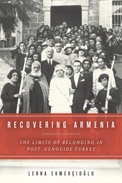
Recovering Armenia: The Limits of Belonging in Post-Genocide Turkey
by Lerna Ekmekcioglu
Stanford University Press, January 2016
The small community of Armenians who stayed in Turkey, mostly in Istanbul, had to find their way forward during a period of emotional trauma, continued discrimination, and political upheaval (the Republic of Turkey was founded in 1923). And many of those people faced an enduring tension: They wanted to modernize society and press for political change, while acknowledging a desire to keep social customs and traditional arrangements intact, as a way of preserving the existentially threatened Armenian community.
“I try to show how the story unfolds for [those] Armenians,” says Ekmekcioglu, who is the McMillan-Stewart Associate Professor of History at MIT and an affiliate of the Women’s and Gender Studies Program at MIT. “They had to or chose to live inside Turkey, alongside the perpetrators. What did they do to make it work for them? How did they adjust to these conditions?” Full Story at MIT News
Turkish translation of Recovering Armenia
Lerna Ekmekcioglu website
MIT History website
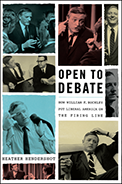
Open to Debate: How William F. Buckley Put Liberal America on the Firing Line
by Heather Hendershot
Harper Collins, October 2016
A unique and compelling portrait of William F. Buckley as the champion of conservative ideas in an age of liberal dominance, taking on the smartest adversaries he could find while singlehandedly reinventing the role of public intellectual in the network television era.
Drawing on archival material, interviews, and transcripts, Open to Debate provides a richly detailed portrait of this widely respected ideological warrior, showing him in action as never before. Much more than just the story of a television show, Hendershot’s book provides a history of American public intellectual life from the 1960s through the 1980s—one of the most contentious eras in our history—and shows how Buckley led the way in drawing America to conservatism during those years.
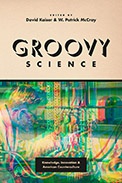
Groovy Science: Knowledge, Innovation, and American Counterculture
co-edited by David Kaiser
Unviersity of Chicago Press, May 2016
In his 1969 book The Making of a Counterculture, Theodore Roszak described the youth of the late 1960s as fleeing science “as if from a place inhabited by plague,” and even seeking “subversion of the scientific worldview” itself. But that view ignores the diverse ways in which the era’s countercultures expressed enthusiasm for and involved themselves in science—of a certain type. Boomers and hippies sought a science that was both small-scale and big-picture. Groovy Science explores the experimentation and eclecticism that marked countercultural science and technology during one of the most colorful periods of American history.
David Kaiser's website
MIT Program in Science, Technology, and Society
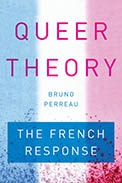
Queer Theory: The French Response
by Bruno Perreau
Stanford University Press, November 2016
What are the various facets of the French response to queer theory, from the mobilization of activists and the seminars of scholars to the emergence of queer media and the decision to translate this or that kind of book? Ironically, perceiving queer theory as a threat to France means overlooking the fact that queer theory itself has been largely inspired by French thinkers. By examining mutual influences across the Atlantic, Bruno Perreau analyzes changes in the idea of national identity in France and the United States. In the process, he offers a new theory of minority politics: an ongoing critique of norms is not only what gives rise to a feeling of belonging; it is the very thing that founds citizenship.
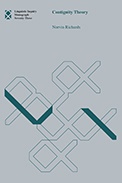
Contiguity Theory
by Norvin Richards
MIT Press, June 2016
Languages differ in the types of overt movement they display. For example, some languages (including English) require subjects to move to a preverbal position, while others (including Italian) allow subjects to remain postverbal. In its current form, Minimalism offers no real answer to the question of why these different types of movements are distributed among languages as they are. In Contiguity Theory, Norvin Richards argues that there are universal conditions on morphology and phonology, particularly in how the prosodic structures of language can be built, and that these universal structures interact with language-specific properties of phonology and morphology. He argues that the grammar begins the construction of phonological structure earlier in the derivation than previously thought, and that the distribution of overt movement operations is largely determined by the grammar’s efforts to construct this structure. Rather than appealing to diacritic features, the explanations will generally be rooted in observable phenomena.
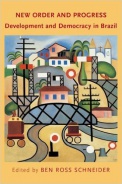
New Order and Progress: Development and Democracy in Brazil
edited by Ben Ross Schneider
Oxford University Press, March 2016
This book offers sobering insight into why Brazil has not been the rising economic star of the BRIC that many predicted it would be, but also documents the gains that Brazil has made toward greater equality and stability.
“I think nobody could have imagined the extent of the corruption crisis,” Schneider told MIT News. “It exceeds previous known corruption crises [in Brazil] by an order of magnitude. There are over 100 people indicted, many of them in jail. There were signs of corruption earlier. But this is bigger than anyone suspected.”